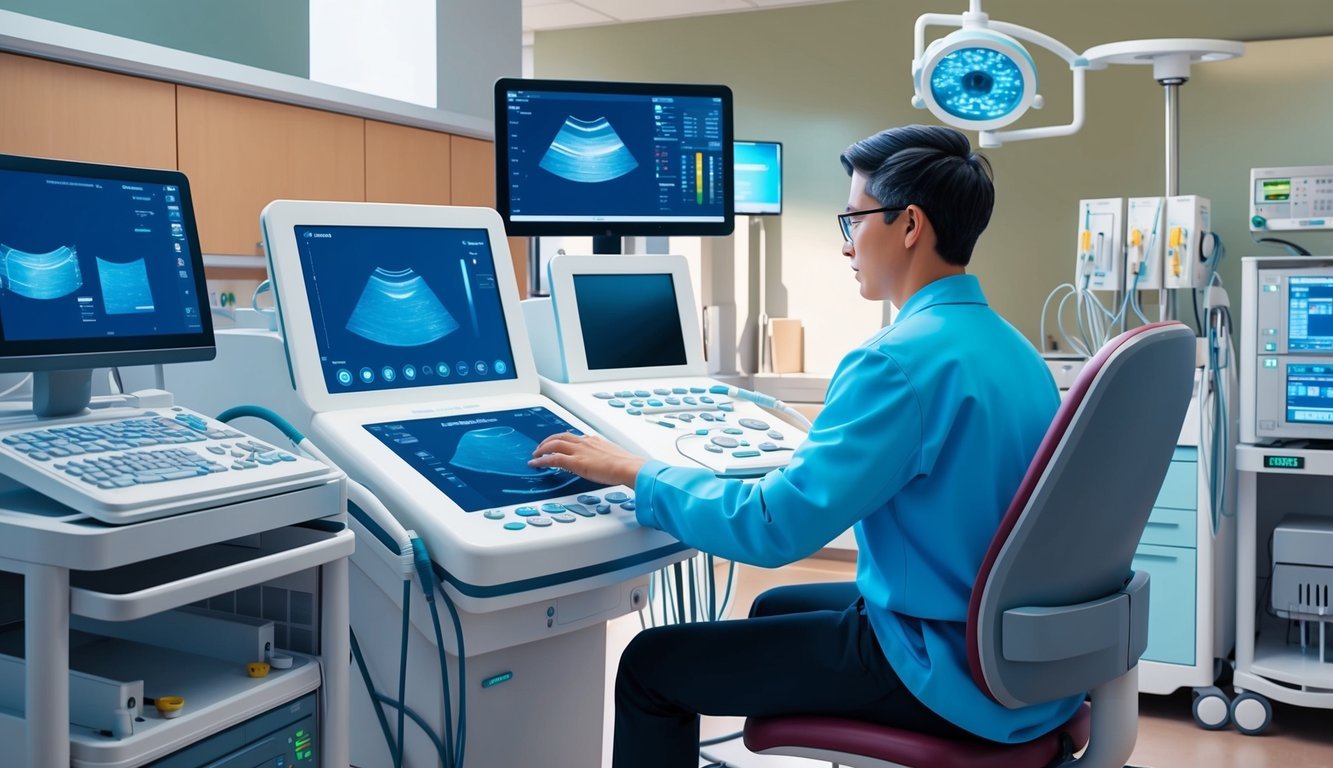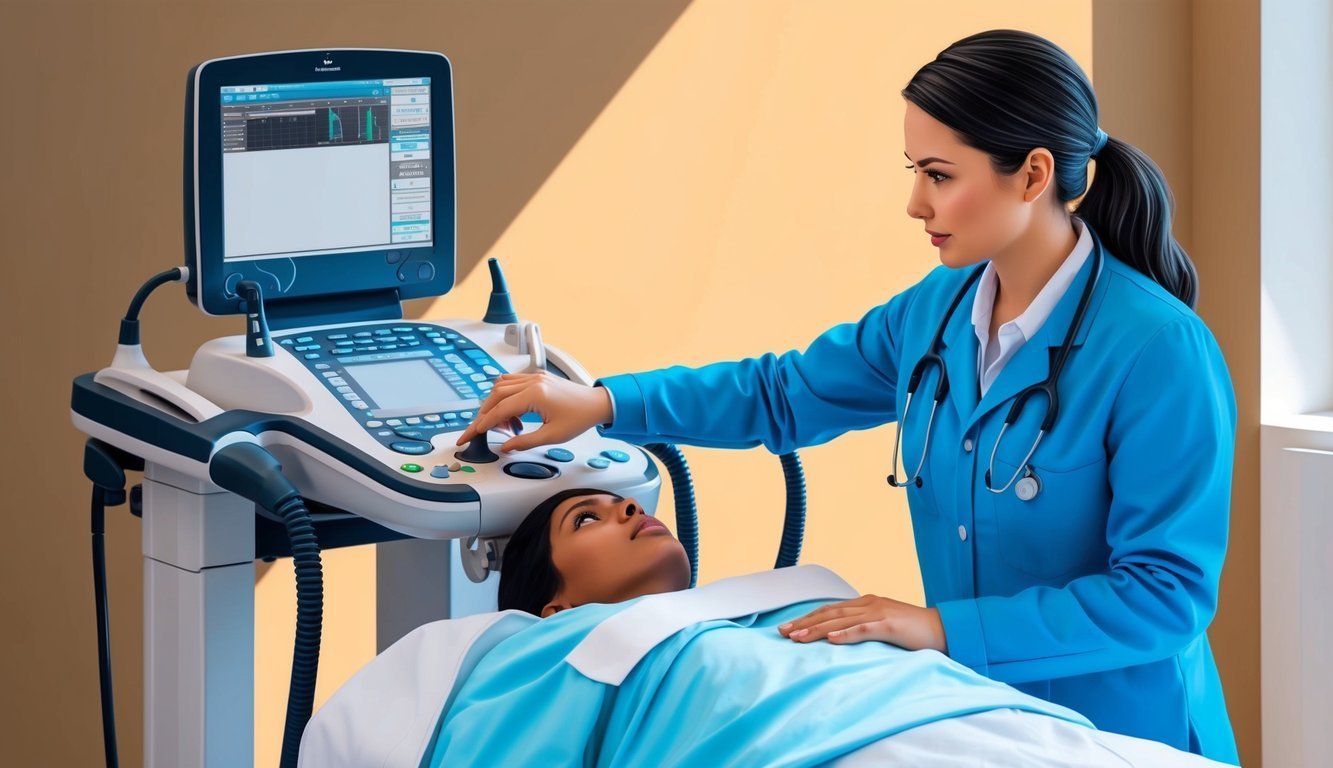As you consider a career as an ultrasound technician, you might wonder, is being an ultrasound tech challenging? This profession requires technical skills, strong communication abilities, and emotional resilience.
Each day presents unique situations, whether it’s dealing with diverse patients or navigating complex technologies.
The role of an ultrasound technician is vital in the healthcare field, as you provide critical imaging services that assist in patient diagnosis.
While the job can be demanding, it also offers meaningful interactions and the satisfaction of making a difference in patients’ lives.
Many find that the rewards outweigh the challenges, especially with the growing demand for healthcare professionals in this area.
Choosing to become an ultrasound technician can lead to a fulfilling career, offered by various paths for advancement and continual learning.
If you’re intrigued by healthcare and enjoy working in a fast-paced environment, this might be the right fit for you.
Key Takeaways
- Being an ultrasound tech involves both challenges and rewards.
- The job plays a critical role in patient care and diagnosis.
- There are many opportunities for career advancement in this field.
Becoming an Ultrasound Technician

Embarking on a career as an ultrasound technician requires a clear understanding of the educational and certification pathways.
This section explores the essential steps involved in becoming a skilled medical sonographer.
Educational Pathways
To become an ultrasound technician, you typically need a high school diploma as the starting point.
From there, you can pursue different educational routes:
-
Associate’s Degree: Most ultrasound techs complete a two-year associate program in diagnostic medical sonography. This option provides foundational knowledge and hands-on training.
-
Bachelor’s Degree: Some opt for a four-year degree, which offers advanced training and may include specialization opportunities.
-
Certificate Programs: If you already have a degree in a related field, a one-year certificate program can help you transition into sonography.
Choosing the right educational pathway depends on your career goals and the time you want to invest in your studies.
Importance of Accreditation
Accreditation plays a crucial role in your education.
You should select a program accredited by the Commission on Accreditation of Allied Health Education Programs (CAAHEP).
Accredited programs ensure that the education meets industry standards, which is vital for your future employment.
Employers prefer graduates from accredited institutions because they are often better prepared for the demands of the job.
Additionally, graduating from an accredited program is typically a requirement for certification exams, making it a key step in your journey to becoming an ultrasound tech.
Certification and Examinations
Certification is essential for demonstrating your expertise as an ultrasound technician.
You should aim to become certified through recognized organizations such as the American Registry for Diagnostic Medical Sonography (ARDMS) or Cardiovascular Credentialing International (CCI).
After completing your education, you will need to pass a certification exam.
This exam typically assesses your knowledge and practical skills in sonography.
Having certification not only enhances your job prospects but also potentially increases your earning potential.
It’s an important milestone in establishing your career as a medical sonographer.
The Role of an Ultrasound Technician
As an ultrasound technician, you play a crucial role in patient care and diagnostic imaging.
Your responsibilities include operating specialized imaging equipment, performing various diagnostic procedures, and ensuring patient comfort throughout the process.
Diagnostic Procedures and Patient Care
You are responsible for conducting ultrasound procedures that provide essential images for diagnosing medical conditions.
This involves gathering patient information, explaining the procedure, and putting patients at ease.
Common procedures you might perform include:
- Abdominal sonography: Evaluating organs like the liver or kidneys.
- Echocardiography: Testing heart functions and structures.
- Breast sonography: Assessing breast tissue abnormalities.
- Vascular sonography: Examining blood flow and circulation.
Your attention to detail helps ensure that the images are clear, allowing doctors to make accurate diagnoses.
Specializations in Sonography
You can choose various specializations within the field of sonography, each focusing on a different aspect of medical imaging.
Some of the key areas include:
- Cardiac sonography: Focusing on heart health and issues.
- Pediatric echocardiography: Working with children’s heart conditions.
- Neurosonology: Imaging the brain and nervous system.
Specializing can enhance your career prospects and allow you to work in specific medical environments that interest you.
Understanding the Equipment
Familiarity with ultrasound machines and imaging equipment is essential to your role.
You need to know how to operate different types of ultrasound machines effectively.
Key equipment aspects include:
- Transducers: These are used to send and receive sound waves.
- Ultrasound gel: Essential for ensuring good contact between the skin and the transducer.
- Imaging software: You will often work with software that helps analyze the images produced.
Your proficiency with these tools ensures accurate imaging and contributes to effective patient diagnoses.
To learn more about sonography certifications, you can visit Ultrasound Schools Info.
Day-to-Day Challenges and Rewards

Being an ultrasound technician involves navigating various challenges while also experiencing significant rewards.
You will find that the job requires a unique combination of technical skills and personal interactions, along with the physical and emotional demands of the role.
Interpersonal Skills and Patient Interactions
As an ultrasound technician, you will interact with a wide range of patients.
Some may feel anxious about their procedures, requiring you to have strong interpersonal skills.
You must be able to explain processes clearly and calmly, putting patients at ease.
Building rapport is essential, as this can lead to better patient cooperation during scans.
You will encounter difficult patients, and your ability to manage these interactions will be vital.
In addition, effective communication with physicians and other healthcare workers is crucial for ensuring accurate diagnoses.
Physical and Emotional Demands
The role is physically demanding.
You may spend long hours on your feet, moving equipment and assisting patients.
This can lead to fatigue and musculoskeletal issues over time.
Being in a healthcare setting means you also face emotional demands.
You will often work with patients experiencing serious health concerns, which can be stressful.
Attention to detail is crucial in your daily tasks.
Any small mistake can lead to incorrect diagnoses.
Thus, maintaining focus during long hours is important.
Balancing these physical and emotional factors is a key part of the job.
Compensation and Job Satisfaction
The salary for ultrasound technicians is generally strong, with a median annual salary of around $70,380.
Compensation varies based on factors like location and specialty, such as cardiac or musculoskeletal sonography.
Many professionals in this field find high job satisfaction.
Not only do you earn a good salary, but you also play a critical role in patient care.
The growing demand for diagnostic medical sonographers indicates strong job security, which can help improve your work-life balance.
Your contributions are significant and appreciated, boosting your overall fulfillment in the role.
Career Advancement and Professional Development

Moving forward in your career as an ultrasound technician involves both continuing education and professional networking.
Engaging in these activities can enhance your skills, expand your knowledge, and open new job opportunities.
Continuing Education and Specialization
To remain competitive in the field, you must meet continuing education requirements.
Many states and employers require you to earn CME credits to maintain your ultrasound certification.
This can often include courses on advanced sonography techniques or specialized areas like vascular ultrasound or cardiac imaging.
Specialization not only boosts your qualifications but also makes you more appealing to employers.
You might consider obtaining ultrasound certifications in various specialties, such as the Sonography Principles and Instrumentation Exam.
This can lead to higher pay and advanced job roles.
Additionally, participating in clinical externships allows you to apply your skills in real-world settings while gaining valuable experience.
Networking and Professional Organizations
Joining professional organizations is crucial for building your network and advancing your career.
Groups such as the American Institute of Ultrasound in Medicine (AIUM) or the Society of Diagnostic Medical Sonography (SDMS) offer valuable resources, including access to conferences and workshops.
These organizations often provide opportunities to connect with peers and mentors who can guide your professional journey.
They may also have job boards and continuing education resources to help you stay informed about the latest technologies and practices in sonography.
Strengthening your communication skills through these networks can further enhance your professional relationships and career prospects.
Job Market Outlook

The job market for ultrasound techs is promising, with numerous opportunities and a strong demand for skilled professionals.
Understanding where you might find work and what the future holds can help you make informed career decisions.
Employment Opportunities and Locations
As an ultrasound technician, you have various job options.
Most professionals work in hospitals, outpatient clinics, and imaging centers.
Some may also find opportunities in private practices, research facilities, or even mobile imaging services.
| Work Environment | Common Employers |
|---|---|
| Hospitals | Health Systems |
| Outpatient Clinics | Diagnostic Imaging Centers |
| Mobile Imaging | Mobile Healthcare Providers |
The need for healthcare workers is rising, contributing to a high demand for ultrasound technicians.
This demand can vary by region, so it’s a good idea to research job availability in your area or wherever you plan to work.
Future Prospects in Sonography
The future outlook for ultrasound techs is quite encouraging.
The employment of diagnostic medical sonographers is projected to grow by 11% from 2023 to 2033, which is much faster than the average for all occupations.
This means more job openings and the potential for advancement.
Factors like an aging population and advancements in medical technology will likely drive this growth.
You might also find increased opportunities in specialized fields like cardiovascular sonography.
Healthcare roles like yours will remain essential, ensuring a stable career path.
For more detailed projections, you can check the complete guide at U.S. Bureau of Labor Statistics.
Frequently Asked Questions

You may have several questions about what it takes to become an ultrasound technician and what the job entails.
This section addresses common concerns related to education, challenges, job satisfaction, and physical demands in this field.
What are the educational requirements to become an ultrasound technician?
To become an ultrasound technician, you need to complete an accredited program in ultrasound technology.
Most programs offer an associate degree, while some provide a bachelor’s degree option.
You’ll study subjects like anatomy, medical terminology, and ultrasound physics.
How long is the typical duration of study for an aspiring ultrasound tech?
Typically, an associate degree program takes about 2 years to complete.
If you choose a bachelor’s program, it can take around 4 years.
Many schools also offer certificate programs for those who already have a degree in a related health field.
What challenges do ultrasound technicians face in their work environment?
Ultrasound technicians often deal with difficult patients during exams.
They may face emotional stress when performing scans on critically ill patients.
Additionally, working long hours in busy healthcare settings can add to the pressure.
How does the workload of an ultrasound tech compare to that of nursing professionals?
The workload of an ultrasound technician can be similar to that of nursing professionals, though it often varies by the work environment.
Both roles may require standing for long periods and managing multiple patients.
However, ultrasound techs primarily focus on imaging studies rather than overall patient care.
What can impact an ultrasound technician’s job satisfaction and career longevity?
Factors such as work environment, relationships with colleagues, and opportunities for advancement can influence job satisfaction for ultrasound techs.
Continued education and professional development can also lead to better job prospects and higher satisfaction.
Are there physical demands or occupational hazards associated with the role of an ultrasound technician?
Yes, ultrasound technicians may experience physical demands such as prolonged standing and the need to help patients into different positions.
Additionally, there is a risk of musculoskeletal issues from repetitive movements.
Practicing good ergonomics is important to reduce these risks.

